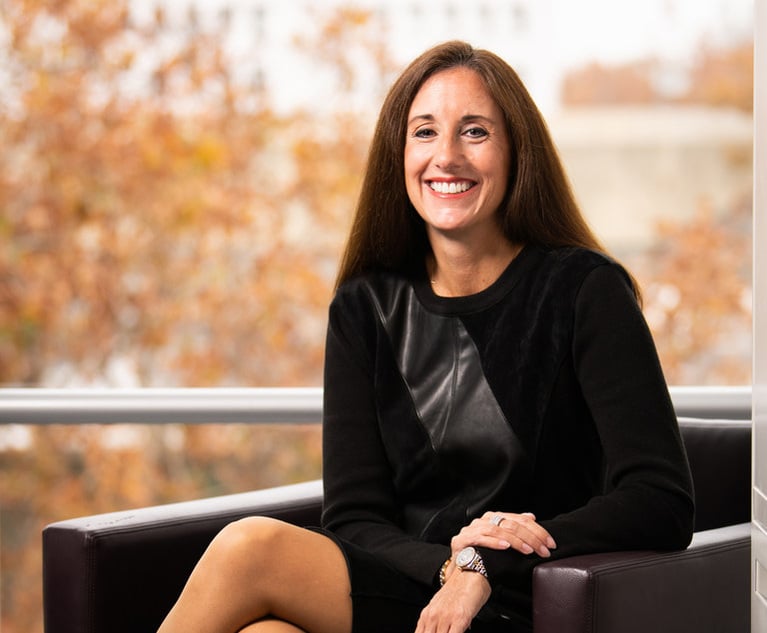Cole Scott Tops the List of Most Diverse Florida Firms
Perhaps unsurprisingly, Hispanics are the most prevalent minority group among Florida's eight largest firms
June 27, 2019 at 06:00 AM
5 minute read
 Credit: Franzi/Shutterstock.com
Credit: Franzi/Shutterstock.com
Cole, Scott & Kissane is the most diverse of Florida's eight largest firms and the sixth most diverse firm in the country, according to data from The American Lawyer's 2019 Diversity Scorecard.
Shutts & Bowen came in second, ranked No. 19, while Greenspoon Marder and GrayRobinson reported the least diversity among its ranks, coming in at No. 80 and No. 128 respectively.
In a legal landscape increasingly defined by client needs, diversity has become a centerpiece issue as Fortune 500 companies and in-house counsel continually demand more diverse teams on their matters.
At Cole Scott, 28% of attorneys identify as racial minorities, with the majority of lawyers identifying as Hispanic. Out of the firm's 433 attorneys, 93 are Hispanic. In fact, the firm ranks No. 6, and has the highest percentage of Hispanic attorneys of the 225 firms that reported nationwide.
Richard Cole, Cole Scott's managing partner, said that the genesis of his firm's push for inclusion came out of a meeting between the firm's senior partners five years ago.
“As we looked around the room we realized we all looked like each other,” Cole said. “That was a real reality check to us that we weren't doing enough.”
Shortly after, the firm began making a concerted effort to be more diverse. It started showing up at minority job fairs; it established a diversity committee; and most importantly, he said, it developed a set of written goals that the firm reviews every quarter.
“Once you recognize that you have an issue, getting people to buy in isn't that hard honestly. It's all about getting people out of their comfort zone. Everybody, including us, wanted to do the easier things first and the hard things last.”
The diversity score is calculated by adding together the total minority percentage and the minority percentage of each firm's partnership, essentially double-counting partners to stress the importance of promoting diverse attorneys through the ranks.
Perhaps unsurprisingly, Hispanics are the most prevalent minority group among Florida's eight largest firms. United State Census Bureau data shows that Hispanics make up 26% of Florida's population — significantly higher than the national average of 17.6%.
Shutts & Bowen came in behind Cole Scott, reporting that 21% of its 277 U.S. attorneys are minorities. Like Cole Scott, Shutts has developed a written diversity and inclusion plan — a key issue to Shutts diversity committee chair Aliette Rodz.
“Our reality is that we continue to work for greater diversity in our workforce,” she said. “It's an ever-changing process to meet the needs of our clients.”
After climbing steadily for the past few years, Carlton Fields dropped 12 spots to No. 25, the greatest drop among the Florida firms. Looking at the data, though, the firm lost only four diverse attorneys as its headcount contracted by ten, suggesting that the drop in ranking is as much a product of diversity improvements at other firms as it is backpedaling at Carlton.
“If our national ranking has dropped, it is only because other firms have made great strides over the past year. That is cause for celebration, as it shows collective progress toward the goal we all share. For Carlton Fields, it's also a cue to redouble our energies in 2019,” said Carlton Fields Chief Diversity Officer Nancy Faggianelli.
Akerman jumped 15 spots to No. 57, marking the biggest improvement in the group. Of the 30 attorneys added to the firm between 2017 and 2018, 14 were diverse attorneys.
“Our success is the cumulative product of years of work on diversity,” said Akerman Chairman and CEO Andrew Smulian.
GrayRobinson, the least diverse among the firms, reported that 11% of its attorneys are minorities, ranking at No. 128 — five spots lower than last year. The firm reported only 16 Hispanic attorneys, three Asian American attorneys, four black attorneys and eight attorneys that identified as “other.”
In response to a request for comment, GrayRobinson President and Managing Director Mayanne Downs said the firm continues to make progress on diversity.
“We measure inclusivity to include LGBTQ status, and other diversity factors, such as national origin, and overcoming challenges,” she said. “Currently, 21% of our non-equity attorneys are diverse, an increase of 17% over the last 3 years, which is a reflection of our continued commitment to inclusivity. We recently welcomed a large class of summer associates, 75% of whom are women and or minority students.”
Related Stories:
Diversity Is So-So at Personal Injury Law Firms in South Florida
Where Do We Stand Regarding Diversity Anyway?
It's About Owning What Diversity and Inclusion Should Mean and Do for Us and Clients
Bottom Line: Diversity Translates to Better Financial Performance
This content has been archived. It is available through our partners, LexisNexis® and Bloomberg Law.
To view this content, please continue to their sites.
Not a Lexis Subscriber?
Subscribe Now
Not a Bloomberg Law Subscriber?
Subscribe Now
NOT FOR REPRINT
© 2025 ALM Global, LLC, All Rights Reserved. Request academic re-use from www.copyright.com. All other uses, submit a request to [email protected]. For more information visit Asset & Logo Licensing.
You Might Like
View All
EB-5 Rebounds After a Rocky Year: Challenges of 2024 Lay Groundwork for a Booming 2025

Greenberg Traurig, Holland & Knight Leaders Expect AI Investments to Jump in 2025
5 minute read
Leveraging the Power of Local Chambers of Commerce: A Second-Career Lawyer’s Guide to Building a Thriving Practice
5 minute readTrending Stories
- 1Reviewing Judge Merchan's Unconditional Discharge
- 2With New Civil Jury Selection Rule, Litigants Should Carefully Weigh Waiver Risks
- 3Young Lawyers Become Old(er) Lawyers
- 4Caught In the In Between: A Legal Roadmap for the Sandwich Generation
- 5Top 10 Developments, Lessons, and Reminders of 2024
Who Got The Work
J. Brugh Lower of Gibbons has entered an appearance for industrial equipment supplier Devco Corporation in a pending trademark infringement lawsuit. The suit, accusing the defendant of selling knock-off Graco products, was filed Dec. 18 in New Jersey District Court by Rivkin Radler on behalf of Graco Inc. and Graco Minnesota. The case, assigned to U.S. District Judge Zahid N. Quraishi, is 3:24-cv-11294, Graco Inc. et al v. Devco Corporation.
Who Got The Work
Rebecca Maller-Stein and Kent A. Yalowitz of Arnold & Porter Kaye Scholer have entered their appearances for Hanaco Venture Capital and its executives, Lior Prosor and David Frankel, in a pending securities lawsuit. The action, filed on Dec. 24 in New York Southern District Court by Zell, Aron & Co. on behalf of Goldeneye Advisors, accuses the defendants of negligently and fraudulently managing the plaintiff's $1 million investment. The case, assigned to U.S. District Judge Vernon S. Broderick, is 1:24-cv-09918, Goldeneye Advisors, LLC v. Hanaco Venture Capital, Ltd. et al.
Who Got The Work
Attorneys from A&O Shearman has stepped in as defense counsel for Toronto-Dominion Bank and other defendants in a pending securities class action. The suit, filed Dec. 11 in New York Southern District Court by Bleichmar Fonti & Auld, accuses the defendants of concealing the bank's 'pervasive' deficiencies in regards to its compliance with the Bank Secrecy Act and the quality of its anti-money laundering controls. The case, assigned to U.S. District Judge Arun Subramanian, is 1:24-cv-09445, Gonzalez v. The Toronto-Dominion Bank et al.
Who Got The Work
Crown Castle International, a Pennsylvania company providing shared communications infrastructure, has turned to Luke D. Wolf of Gordon Rees Scully Mansukhani to fend off a pending breach-of-contract lawsuit. The court action, filed Nov. 25 in Michigan Eastern District Court by Hooper Hathaway PC on behalf of The Town Residences LLC, accuses Crown Castle of failing to transfer approximately $30,000 in utility payments from T-Mobile in breach of a roof-top lease and assignment agreement. The case, assigned to U.S. District Judge Susan K. Declercq, is 2:24-cv-13131, The Town Residences LLC v. T-Mobile US, Inc. et al.
Who Got The Work
Wilfred P. Coronato and Daniel M. Schwartz of McCarter & English have stepped in as defense counsel to Electrolux Home Products Inc. in a pending product liability lawsuit. The court action, filed Nov. 26 in New York Eastern District Court by Poulos Lopiccolo PC and Nagel Rice LLP on behalf of David Stern, alleges that the defendant's refrigerators’ drawers and shelving repeatedly break and fall apart within months after purchase. The case, assigned to U.S. District Judge Joan M. Azrack, is 2:24-cv-08204, Stern v. Electrolux Home Products, Inc.
Featured Firms
Law Offices of Gary Martin Hays & Associates, P.C.
(470) 294-1674
Law Offices of Mark E. Salomone
(857) 444-6468
Smith & Hassler
(713) 739-1250







